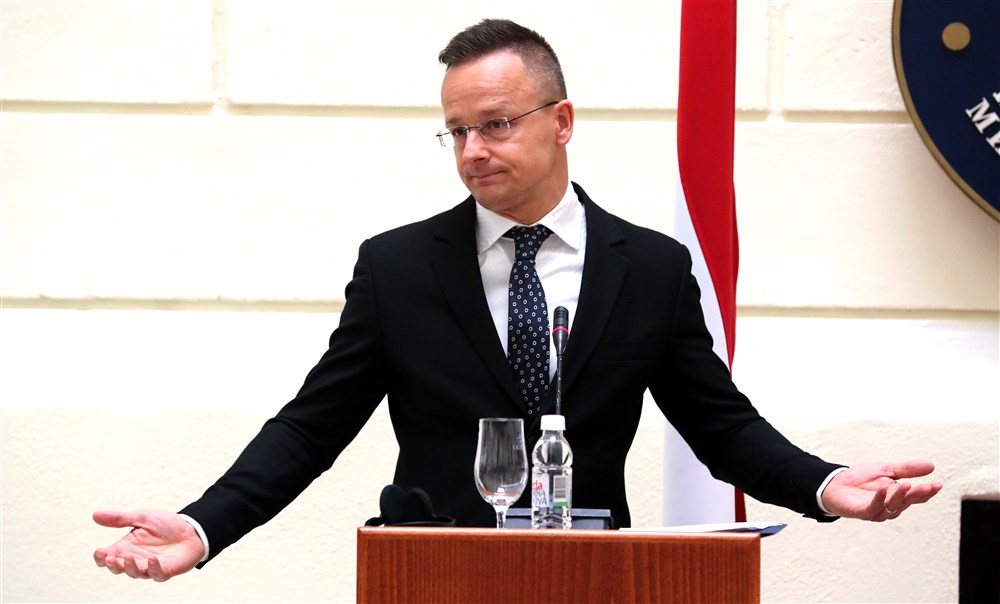The most recent Eurobarometer poll suggests support for the EU in Hungary has dropped to below 40 per cent.
Conducted twice a year for all 27 Member States, the result of the Hungary poll—which surveyed 1,040 individuals—represents a 12 per cent drop, the biggest among the 27 member countries.
Relations between Hungary and Brussels have become fraught during the war in Ukraine. Could Hungary could follow the UK’s example and do its own ‘Huxit’?
“No one is talking about Huxit in Hungary,” Agoston Mraz, the director of the Hungary-based Nézőpont Institute, which conducts research and polls in Hungary, tells the Brussels Signal. “Maybe there are some in Brussels who want it, but it’s not possible here.”
He explains that the EU common market “is good for Hungary”, while German car manufacturing plays a major role in the Hungarian economy. Any fissure with the EU would have a “very high cost” for Hungary—hence the government is against it.
He notes that if you parse the finer details of the Eurobarometer poll, the numbers reflect “less enthusiasm” but do not actually equate to a “negative” view of the EU. There has been an increase in those who reported “neutral” feelings towards Brussels.
That loss of enthusiasm is largely due to Hungarians feeling that “Brussels is being unfair”, Mraz explains, and that “their voices are not being listened to.”
This is especially the case regarding Brussels withholding billions of euros in economic assistance to Hungary, including Covid reconstruction funds, due to ongoing disagreements with Viktor Orban’s government.
“He is criticising the sanctions, loudly and clearly, as there is high inflation all over Europe and these measures are not working—the sanctions are meant to achieve peace, and we can’t get it,” Mraz says.
The Hungarian Minister of Foreign Affairs Péter Szijjártó recently spoke out against the “warlike mood” pervading the EU.
Tensions and concerns about a possible West to East drift in Hungary are even seeing the US get involved. Recent ads funded by the American embassy in Budapest have carried the slogan “Russians go home”, once a rallying cry against Hungary’s 1956 Soviet invasion. The embassy has justified the ads based on the government controlling the media and opportunities to connect directly with Hungarians.
Hungarians do not seem to approve—as a poll by Nézőpont suggests. The poll found that 59 per cent “do not consider the billboard campaign by the US Embassy acceptable.” Even among those who do not support Orban’s government, roughly a third—38 percent—regarded “Washington’s action in Hungary as unacceptable”.
Despite this, the poll found that 40 percent of Hungarians would tighten Hungarian-US relations and 26 percent would maintain them at the same level. It would appear that Hungarians are capable of nuance, as Mraz says.
“Orban is criticising the leaders of the EU, but that is not the same as the EU institutions,” Mraz says. “He is criticising the leaders because he thinks the Brussels bubble is dangerous and misleading and that they should be listening to Member States. He wants a strong alliance of members states, not a Federal Europe.”
“Orban’s views do not reflect the mainstream, but that does not mean he is against the EU,” Mraz says.
Hungary is not the only country that has seen impressions about the EU waver, according to the Eurobarometer poll. Positivity about the EU also dropped by eight per cent in Poland, to 55 per cent. Support is even lower in Slovakia, which experienced a drop of seven per cent to 37 per cent.
The lowest level of support is in the Czech Republic where only 33 per cent of Czechs reported feeling positive about “life in the European Union”, a drop of six per cent.





